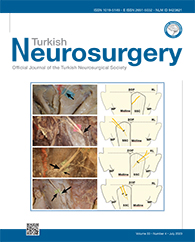2Queen Mary University of London, Barts and The London School of Medicine and Dentistry, Blizard Institute, London, United Kingdom
3Chang Gung Medical College and University, Chang Gung Memorial Hospital at Linkou, Department of Internal Medicine, Taiwan DOI : 10.5137/1019-5149.JTN.33659-21.3 AIM: To identify the effect of patients with diabetes mellitus (DM) with traumatic brain injury (TBI) in Taiwan.
MATERIAL and METHODS: Data from the trauma registry in Chang Gung Memorial Hospital, Linkou, Taiwan were collected and reviewed. Several clinical characteristics and outcomes were extracted and analyzed. The trauma databank includes 3090 patient medical records, of which 475 patients were identified as having DM. Because several baseline characteristics of patients with TBI in the DM group differed from those in the non-DM group, we performed propensity score matching to eliminate confounding factors.
RESULTS: After propensity score matching, 895 patients with TBI comprised the non-DM group, and no significant differences were noted in the baseline characteristics between groups. Patients in the DM group had more craniotomies, longer hospital stays, and longer ICU stays. We also segmented the DM group into two subgroups based on survival status. Compared with the survivor group, the nonsurvivor group had a significantly higher serum glucose level. Furthermore, patients with DM were divided into four subgroups according to their serum glucose level. The in-hospital mortality rate was higher in the subgroup with glucose levels greater than 200mg/dL than in the other subgroups. A receiver-operating-characteristic analysis revealed that the ability of serum glucose level to predict in-hospital mortality was modest, with an area under the curve of 0.641 and an associated optimal cutoff of 206 mg/dl.
CONCLUSION: DM should be considered a risk factor for patients with TBI receiving neurosurgical intervention and a predictor of longer hospitalization and stay in an intensive care unit. Moreover, in patients with TBI with DM, higher admission serum glucose levels are associated with a higher in-hospital mortality rate.
Keywords : Traumatic brain injury, Diabetes, Hyperglycemia, Outcome




